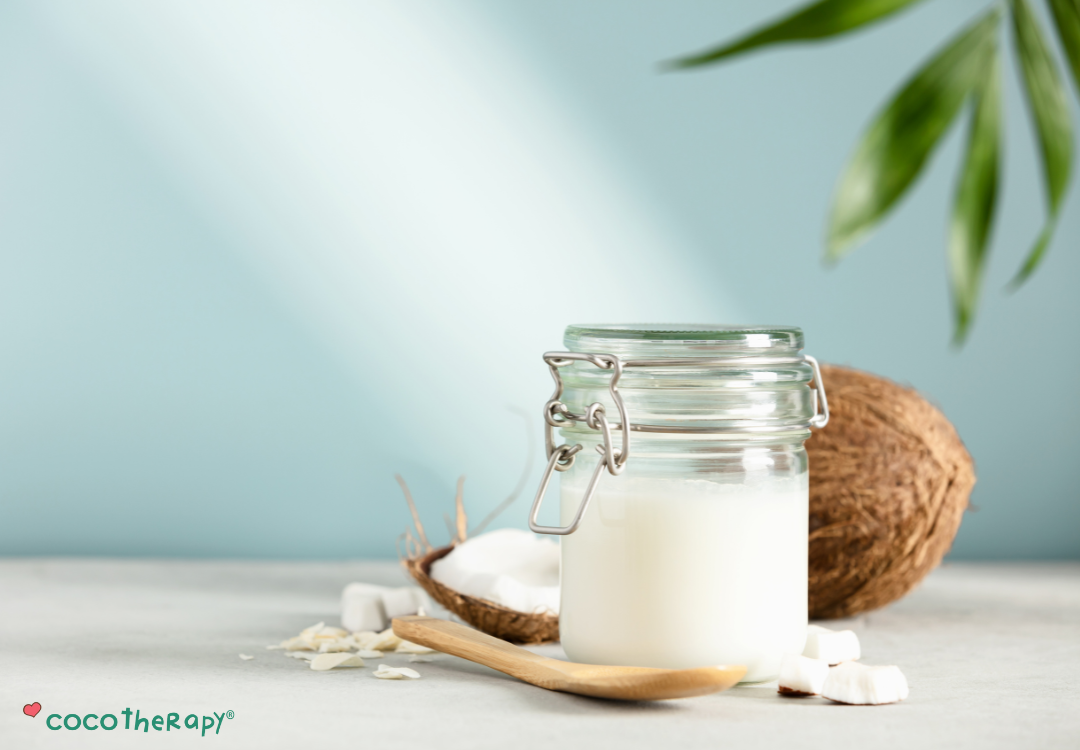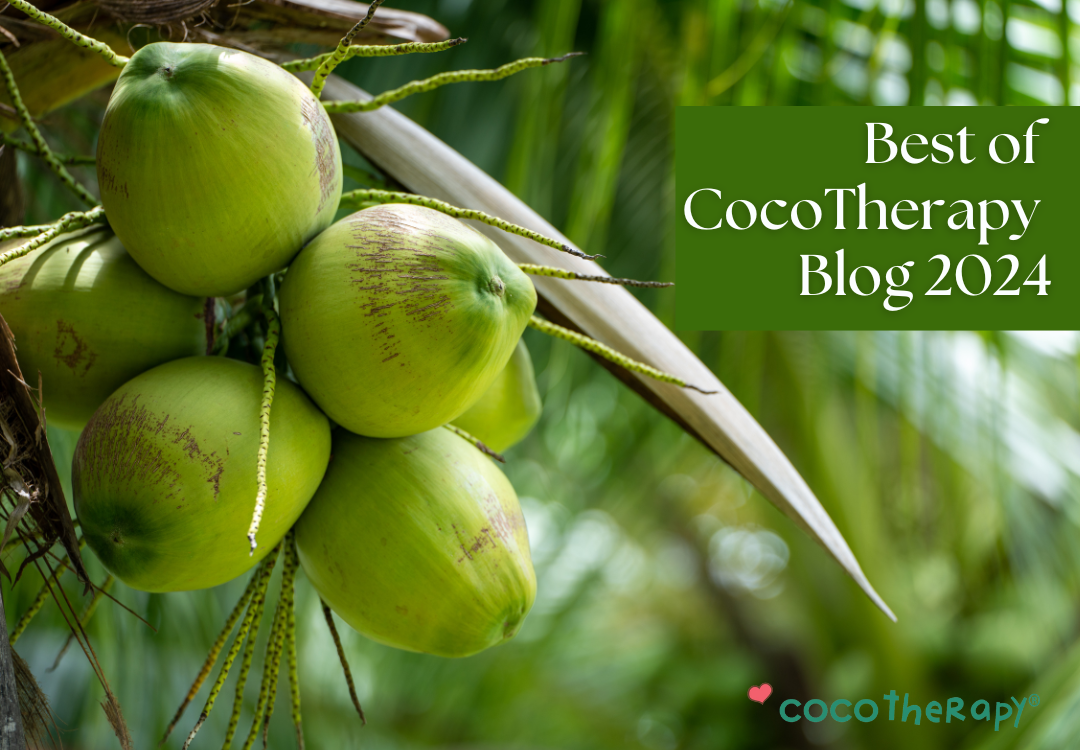As pet parents, we do everything we can to keep our furry friends happy and healthy. But in today’s world, pets are exposed to a surprising number of toxins – from chemicals in their environment to additives in their food. Over time, these toxins can build up, creating a “toxic load” that can impact their health in significant ways.
The good news? There are natural, effective ways to detoxify your pet and reduce their toxic load. By making simple changes and incorporating therapeutic ingredients like coconut oil, you can support your pet’s immune system, digestion, and overall well being.
In this post, we'll explain how toxins enter your pet’s body, the impact they can have, and why coconut oil is a fantastic natural detoxifier. We’ll also share practical tips to reduce your pet’s exposure to toxins and easy ways to add coconut oil to their routine.

How Do Toxins Enter Your Pet's Body?
Pets encounter toxins daily, often in ways we might not expect. Here are some common sources of toxins and how they can affect your pet:
- Environmental pollutants. Air, soil, and water can carry harmful substances, from industrial chemicals to pesticides sprayed in public spaces. Pets that spend time outdoors may come into contact with these pollutants more frequently, either through their paws or ingestion while grooming.
- Household chemicals. Cleaning products, disinfectants, air fresheners, and pest repellents often contain harsh chemicals that can irritate your pet’s skin or respiratory system. Even brief exposure, such as walking across a recently cleaned floor, can contribute to toxic buildup over time.
- Processed pet food. Many commercial pet foods include artificial preservatives, flavorings, and fillers that are difficult for pets to process. Over time, these additives can contribute to inflammation, digestive issues, and strain on the liver and kidneys.
- Medications and vaccines. While necessary in some cases, overuse of medications like antibiotics or steroids can increase your pet’s toxic load. Similarly, annual vaccinations that aren’t always required can introduce unnecessary chemicals into their system.
-
Indoor allergens. Mold, tobacco smoke, and dust are common household toxins that pets breathe in daily. These can lead to chronic respiratory or skin issues if exposure isn’t minimized.
The Effects of Toxic Load on Your Pet's Health
When your pet’s body becomes overwhelmed by toxins, their health may start to suffer. The immune system works tirelessly to remove these harmful substances, but once overwhelmed, the consequences become noticeable.
Skin issues like redness, rashes, or itchiness are often one of the first signs. Digestive problems, such as vomiting, diarrhea, or a sensitive stomach, are also common. Over time, the liver and kidneys – your pet’s primary detox organs – may struggle to function efficiently, leading to chronic inflammation and a weakened immune system.
In severe cases, a high toxic load can contribute to the development of serious health conditions, including cancers and neurological disorders. Detoxification plays a vital role in relieving these systems, allowing your pet’s body to function at its best.
Why Coconut Oil Is a Natural Detoxifier for Pets
Did you know coconut oil can help detox your pet naturally? With its high levels of medium-chain triglycerides (MCTs), it’s a great way to support their liver, gut, and immune system!
Coconut oil helps support liver health by breaking down and removing toxins. The liver, as the body’s main detox organ, benefits from the energy boost that coconut oil’s MCTs provide. By improving liver efficiency, coconut oil helps ensure that toxins are processed and removed more effectively.
Since it’s rich in antioxidants, coconut oil also helps combat oxidative stress caused by environmental toxins. Oxidative stress leads to cellular damage and contributes to inflammation, but antioxidants neutralize harmful free radicals, protecting your pet’s overall health.
In addition, coconut oil’s ability to balance gut health boosts its natural detoxifying effects. A healthy microbiome plays a critical role in eliminating toxins from the digestive system, and coconut oil supports this process. Its antimicrobial properties help reduce harmful bacteria while promoting the growth of beneficial bacteria.
Let’s take a look at some studies that dive deeper into how coconut oil benefits pets as a natural detoxifier:
Study #1: Coconut Oil and Liver Detoxification
A 2017 study titled Virgin coconut oil reverses hepatic steatosis by restoring redox homeostasis and lipid metabolism in male Wistar rats sheds light on how coconut oil can support liver health. The researchers found that virgin coconut oil (VCO) helped reduce oxidative damage in the liver and restore balance to lipid metabolism.
This means it not only helps the liver process fats more efficiently but also protects it from harmful damage caused by toxins. Thanks to its antioxidant-rich profile, VCO offers a natural way to give your pet’s liver the support it needs to stay healthy and strong.
Study #2: Combating Oxidative Stress
In a 2019 study, The protective role of virgin coconut oil on the alloxan-induced oxidative stress in the liver, kidneys, and heart of diabetic rats, researchers explored how virgin coconut oil (VCO) could protect against oxidative stress. They found that daily VCO supplementation improved key health markers, reducing oxidative damage in the liver, kidneys, and heart.
This makes coconut oil an excellent choice for pets, especially those exposed to environmental toxins, as oxidative stress often contributes to chronic health problems. With its powerful antioxidants, VCO helps protect your pet’s cells from free radical damage and inflammation, keeping them healthier and more resilient.
Study #3: Supporting Gut Health
A recent 2023 study titled Fecal Microbiota, Bile Acids, Sterols, and Fatty Acids in Dogs with Chronic Enteropathy Fed a Home-Cooked Diet Supplemented with Coconut Oil explores how virgin coconut oil (VCO) can benefit gut health. The study observed dogs with chronic enteropathy that showed significant symptom improvements when their diets were supplemented with VCO.
By reducing fat excretion and introducing beneficial medium-chain fatty acids (MCFAs) into the digestive system, VCO helps promote a balanced microbiome. This not only improves digestion but also aids in toxin elimination, making it a valuable addition to your pet’s detox routine.
Practical Tips for Detoxifying Your Pet
Now that we've looked at the sources of toxins and the benefits of detoxifying, let’s explore some simple, actionable steps to help reduce your pet’s toxic load and support their overall wellbeing:
- Feed a balanced diet. Avoid feeding your pet low-quality commercial pet food, as most commercial pet foods are processed and packed full of cheap ingredients and fillers. Instead, provide high-quality, species-appropriate food that’s free from artificial additives and fillers. A clean diet promotes overall health and reduces the buildup of toxins over time.
- Offer filtered water. Avoid tap water, which may contain harmful contaminants like heavy metals, fluoride, and chlorine. Investing in a water filtration system is the most cost-effective way to ensure that your pet's drinking water is safe and healthy to drink.
- Minimize chemical exposure. Although toxins can be difficult to avoid completely, there are several ways you can minimize your pet's exposure. Switch to natural cleaning products, avoid synthetic air fresheners, and limit your pet’s contact with areas treated with pesticides or fertilizers. It's also a good idea to bathe your pet regularly to help remove any toxins they may have come into contact with.
-
Reduce medications when possible. Many veterinarians are now speaking out against annual vaccine boosters, deeming them unnecessary and dangerous. Instead of routinely vaccinating your pet, ask your vet to do a titer test to determine if your pet is still protected. In addition, work with a holistic vet to explore natural alternatives to overused drugs like steroids or antibiotics.
How to Incorporate Coconut Oil Into Your Pet’s Routine
As discussed earlier, using coconut oil as a natural detoxifier is another great way to reduce your furry friend's toxic load. Here are some simple ways to incorporate coconut oil into your pet’s routine:
Add It to Meals
Mixing coconut oil into your pet’s food is one of the easiest ways to take advantage of its detoxifying benefits. Start with a small amount – 1 teaspoon per 10 pounds of body weight daily – and increase gradually if needed.
If your pet has a sensitive stomach, start with an even smaller amount and watch how they respond. Introducing coconut oil gradually helps their digestion adjust and ensures they can enjoy the benefits without any discomfort.
Use It Topically
Coconut oil can also be applied directly to your pet’s skin. Massage a small amount onto areas of dryness, irritation, or redness to soothe discomfort and support skin detox. Its antimicrobial and anti-inflammatory properties make it a natural solution for skin health.
Applying it topically can also be a great way to bond with your pet, making grooming time more enjoyable for both of you. Just make sure to use only a small amount to prevent leaving a greasy residue.
Create Homemade Treats
Incorporating coconut oil into homemade snacks is a great way to combine its benefits with something your pet will enjoy. Try freezing coconut oil in silicone molds for a simple, refreshing treat, or bake it into recipes for a nutritious snack.
Treats made with coconut oil can also be a useful way to sneak in other detox-friendly ingredients, like turmeric or parsley, for an added health boost.
Ready to Start Your Pet’s Detox Journey?
Detoxifying your pet is one of the best ways to support their long-term health and wellbeing. By reducing their toxic load and incorporating natural remedies like coconut oil, you can help them thrive from the inside out.
At CocoTherapy, we’re proud to offer CocoTherapy Organic Virgin Coconut Oil, a therapeutic-grade oil specifically designed to support your pet’s health. Packed with lauric acid, antioxidants, and MCTs, it promotes detoxification, supports digestion, and strengthens immunity.
In addition to our Virgin Coconut Oil, explore our unique coconut oil blends, including Coco-Gold, made with organic turmeric, black pepper and ginger, and Coco-Ghee, a powerful combination of our Virgin Coconut Oil and cultured ghee. These blends are specially formulated to help reduce inflammation, support the immune system, and promote gut health. Give one of them a try and see the difference for yourself!



